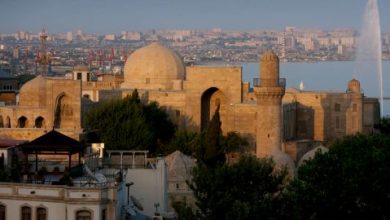
Though he had died, his creation lived. Life’s essence, distilled in scent and verse, had outlasted mortality
 [Shamsher-ul-Hyderi (15 September 1932 – 10 August 2012) was a Sindhi poet, writer and journalist.]
[Shamsher-ul-Hyderi (15 September 1932 – 10 August 2012) was a Sindhi poet, writer and journalist.]
By Raphic Burdo
The door of Shamsher’s apartment had been ajar since the first light of dawn. No one had keys, and yet it had not been forced. A delicate swirl of scents, jasmine, oud, vanilla, and something faintly metallic, seeped into the cracked hallway, making the air feel almost alive. Shadows quivered along the walls, stretching and shrinking like breath. Somewhere, faintly, a voice recited poetry. Not a human voice, yet unmistakably his.
“The door stands open, someone may come.
All the world is sleeping, someone may come.
The moonlit night is clear, the clouds are drizzling;
All is set and done, someone may come.
Was it the wind that stirred a leaf, or silence sobbed and heaved?
Some soul is alone, someone may come.
The heart drifts in idle dreaming,
Does not believe the eyes;
She is trained to see unknown, someone may come.
All love is repaid, all dossiers are folded,
Yet the heart has to yearn, someone may come.
Only a sip of life remains in the fading cup of life, someone may come.
In the wilderness of longing, ‘Shamsher’ the wanderer is waiting, someone might come.”
Shamsher lay on the faded Persian rug, his body cold and motionless. Yet the apartment was alive, humming with the memory of him. Each bottle of perfume, each dog-eared book, each flickering shadow seemed charged with his presence. The room smelled of Clive Christian Imperial Majesty, Roja Perfumes Haute Luxe, Chanel Les Exclusifs, Lalibela Black Orchid, Tom Ford Black Orchid, and Dior J’adore, each scent a fragment of the man himself, distilled into something almost sacred.
The bookshelves sagged under tomes of wisdom and wonder: Diwan-e-Ghalib, Shah Abdul Latif Bhittai’s Risalo, Fiaz’s Nuskha Hai Wafa, Camus’ The Stranger, Sartre’s Being and Nothingness, Kierkegaard’s Fear and Trembling, Nietzsche’s Thus Spoke Zarathustra, Heidegger’s Being and Time, Kafka’s The Trial, Dostoevsky’s Notes from Underground, Hesse’s Siddhartha. These were Shamsher’s talismans against the absurdity of life, the companions of his meditations on being and purpose, the guides to his quiet journey toward self-actualization.
Tajal, the newspaper boy, pedaled slowly down the cracked street below. Even from a distance, he could smell the perfume curling from the apartment, a scent so sweet and strange it seemed to tug at memory itself. He paused at the gate. “Sir… are you awake?” he whispered. There was no reply. Only the perfume thickened, almost answering in its own language.
Across the hall, Mrs. Sadori leaned out from her window, her shawl tugged tightly around her shoulders. “Tajal! Do you smell that? It’s… it’s unnatural! What is he doing in there?”
“He… he’s always like that,” Tajal said, his voice quiet. “But something feels… different today.”
Shamsher had always lived deliberately, often to extremes. He had starved, gone days without a proper meal, but he never denied himself beauty — perfume, poetry, philosophy. Each day he wrote, read, inhaled, observed, and refined the art of living. He sought to transcend the triviality of daily existence through creation, through deliberate acts of beauty, and through sharing that beauty in subtle ways.
The city itself seemed to respond to him. A cat with one green and one amber eye lingered beneath his balcony, as if it knew secrets. The streetlights flickered in patterns, almost signaling a rhythm. In a café across the avenue, a young poet inhaled the scent of Lalibela Black Orchid that had drifted through the open window and suddenly saw, in a vision, her childhood self-laughing and running through a sunlit orchard she had long forgotten.
Inside the apartment, the stereo whispered again:
“The heart drifts in idle dreaming,
Does not believe the eyes;
She is trained to see unknown, someone may come.”
Shamsher’s life had been one of quiet rebellion against meaninglessness. Existentialist philosophers had haunted his nights — Sartre’s freedom, Camus’ absurdity, Kierkegaard’s anxiety, Heidegger’s being — yet he had transformed their theories into living practice. Not merely understanding life’s absurdity, he had sought to fill it with essence, beauty, and purpose, leaving tangible traces in the world through poetry and perfume.
Over the next days, news spread. Shamsher had died. The city reacted in waves — shock, disbelief, then awe. Perfumes hung thick in the air like a lingering ghost. Admirers and curious strangers crowded the hallway; even those who had never met him felt compelled to witness the apartment where the man had lived. The books, once gathering dust, were sought out, and his verses circulated like a secret that had suddenly become public.
Tajal returned to the apartment, drawn by an invisible thread. The shadows pooled at the corners, stretching toward him, moving as if alive. He picked up Shamsher’s journal from the desk. A final note caught his eye:
“I have lived fully in small ways, in scent, in verse, in noticing. If I am gone, let my poems be the air you breathe, let my perfumes be the music of the unseen. Let the door stand open, someone may come.”
A single bottle of Black Orchid fell from the dressing table, shattering. The room filled with a rich, heady cloud that seemed to pulse and breathe. Outside, the city itself seemed to inhale. Faintly, Shamsher’s voice recited again:
“All love is repaid, all dossiers are folded, yet the heart has to yearn, someone may come.”
No one stood in the apartment. Yet the room throbbed with presence, a tangible echo of a man who had mastered the art of leaving traces beyond death.
Mrs. Sadori came by the next day. She smelled the perfume and laughed softly. “I don’t understand him, but… I feel… lighter. As if someone has left the world a gift.”
Tajal nodded. “It’s him. He’s… everywhere.”
A mysterious visitor arrived briefly at twilight, a stranger carrying a notebook of poems and a memory of Shamsher’s presence. “Do you smell it?” the visitor said to Tajal, eyes wide. “He hasn’t left. He’s here, in the air, in the lines, alive.”
Tajal did not fully understand, yet he felt it — life’s essence, distilled in deliberate acts, lingering beyond mortality. Each bottle of perfume, each line of poetry, each moment of mindful creation had become part of the city, part of everyone who had come near him.
Weeks passed. Life resumed its usual rhythms, but subtle magic remained. A passerby inhaled Dior J’adore and glimpsed a vision of a loved one long gone; a writer reading a scrap of Shamsher’s handwriting found the courage to complete a novel left half-finished; a child playing in the street paused to smell the air and felt inexplicably inspired. The man was gone, yet his work — the essence of life he had cultivated — pulsed with energy.
One evening, Tajal returned to the apartment for the last time, older now, hair streaked with gray. The city hummed outside. He opened the door. The room smelled of Chanel No. 5 L’Eau, delicate and luminous. Shadows pooled at corners, moving almost of their own accord. Then, for a brief heartbeat, a shimmer appeared in the mirror. There he was — Shamsher, smiling, hand raised in quiet farewell.
Tajal blinked. No one stood there. Only the perfume remained. Only the poetry remained:
“The moonlit night is clear, the clouds are drizzling;
All is set and done, someone may come.”
The door closed gently behind him. Yet the fragrance lingered, the verses lingered, and Shamsher’s presence — though unseen — would haunt the city forever.
Though he had died, his creation lived. Life’s essence, distilled in scent and verse, had outlasted mortality. The man who had devoted decades to beauty, philosophy, and poetry had achieved a quiet, magical immortality. In every inhalation of perfume, in every echo of his verses, the city remembered: the true art of living is to leave the world a little richer than you found it.
And somewhere, very softly, the voice whispered again:
“Let the door stand open, someone may come.”
Read: A Firebrand Who Shattered Silence
_____________
Raphic Burdo is public policy expert focused on impact of digital technologies on leadership, governance, education and markets




